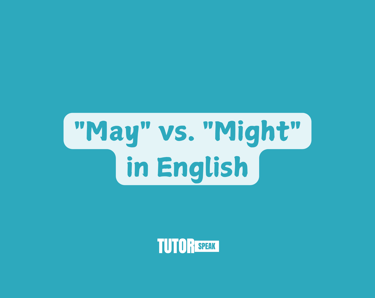May vs. Might in English: Understanding the Differences
In English, both may and might are modal verbs used to express possibility, permission, or uncertainty. While they have some overlap in meaning, they are used in slightly different ways in various contexts.
TutorSpeak
12/17/20243 min read


May vs. Might in English: Understanding the Differences
In English, both may and might are modal verbs used to express possibility, permission, or uncertainty. While they have some overlap in meaning, they are used in slightly different ways in various contexts.
1. Expressing Possibility
May and might are often used to express possibility. However, might is typically considered slightly less certain than may.
May: Used to indicate a higher possibility or probability.
Example: "It may rain later today." (There is a reasonable possibility of rain.)
Might: Used to indicate a lower possibility or a more speculative chance.
Example: "It might rain later today." (The possibility of rain is less certain.)
2. Asking for Permission
May is traditionally used to ask for permission, particularly in formal contexts.
May: More formal and polite.
Example: "May I borrow your book?"
Might: Used less commonly for permission, but can be used in more polite or tentative requests.
Example: "Might I borrow your book?" (Slightly more formal or tentative than "May I?")
3. Expressing Wishes or Suggestions
May is often used to express wishes or hopes in a more formal or optimistic tone.
May: Often used in formal wishes or blessings.
Example: "May you have a wonderful day!"
Might: Can be used for less certain suggestions or wishes.
Example: "You might want to try the new restaurant."
4. Expressing Uncertainty or Hypothetical Situations
Might is generally used in hypothetical situations or to express more uncertainty compared to may.
Might: Suggests less certainty and often refers to something that is hypothetical or unlikely.
Example: "She might go to the party if she finishes her work."
May: Although it can be used to express uncertainty, it tends to indicate a higher possibility.
Example: "She may go to the party if she finishes her work."
5. Past Possibilities
Might is often used to refer to a past possibility that did not occur.
Might: Refers to past possibilities or actions that were uncertain.
Example: "She might have left the house already." (It’s possible, but not certain, that she left.)
May is typically not used for past possibilities.
6. Formality and Tone
May tends to sound more formal than might, which gives it a slightly more casual or speculative tone.
May: More formal and polite.
Example: "May I speak with the manager?"
Might: Slightly more casual or tentative.
Example: "Might you know the way to the station?"
Summary: May vs. Might
May and Might are modal verbs that both express possibility, permission, and uncertainty. They are often interchangeable but can differ in subtle ways depending on the context.
May:
Used for higher probability or certainty.
Often used for formal requests or permission.
Commonly used to express wishes or hopes.
Indicates a stronger possibility of something happening.
Refers to present or future situations.
Might:
Used for lower probability or more speculative possibilities.
Can be used in polite requests, though less common than may.
More commonly used for hypothetical or uncertain situations.
Indicates weaker possibility or something that is less likely.
Often used to express past possibilities.
Key Differences:
May is often used for higher probabilities or formal contexts.
Might is used for hypothetical situations, past possibilities, and when expressing more uncertainty.
Exercises
1. Choose the correct modal verb (May or Might):
I ______ go for a walk this evening, but I’m not sure.
______ I use your phone for a minute?
She ______ not attend the meeting tomorrow due to personal reasons.
It ______ rain later, so bring an umbrella just in case.
He ______ have finished his project by now.
2. Fill in the blanks with may or might:
They ______ not come to the party if they’re busy.
I ______ visit the museum tomorrow if I have time.
______ I leave early today?
You ______ want to try this restaurant; it has great reviews.
The train ______ be delayed because of the snow.
3. Correct the sentence if needed:
Might I ask for your assistance with the report?
She may of left her keys in the car.
I may go out later, but I’m still deciding.
It might rain later, you should bring a jacket.
He may not coming to the party tonight.
4. True or False:
Might expresses a higher probability than May.
May can be used for permission in formal contexts.
Might is often used to describe past possibilities.
May is never used in polite requests.



